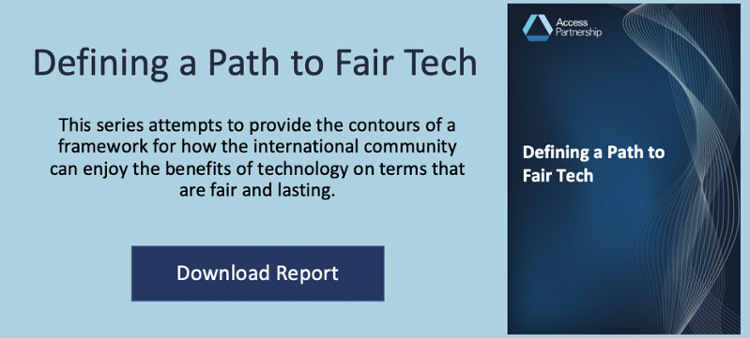
Luca Elmosi
Head of Multilateral Policy Campaigns
[email protected]
While we don’t necessarily have a common understanding of what “fair technology” is, we know very well what taxes are. “Taxes are beautiful”, an Italian finance minister once said, meaning that we can get some moral gratification when we consider that, through tax, public services can be provided efficiently and wealth can be redistributed to benefit the least advantaged. Nowadays, knowing that taxes work their best only when everyone chips in, and seeing that digital services are disrupting entire industry verticals – all the while making sizeable revenues – policy-makers across the globe are looking at ways to make sure that “highly profitable multinational” digital companies can fully appreciate the beauty of taxes.
But thinking about the benefits that technology brings to our life – not least the possibility to keep on working, studying, accessing and sharing information during a global lockdown – are we really sure that increasing taxation on digital companies is the best way forward? How do we ensure that a bigger tax burden does not impact global availability of digital services? Would the least advantaged be better off? And what would be the fair share that digital companies should pay?
This article provides tentative answers to these questions.
Does Taxing Digital Services Enable a Better Deal for the Worse Off Than They Would Get Otherwise?
It is taken as almost axiomatic that technological innovation is a major enabler of the long-term economic growth which puts businesses in the position to create more jobs, and gives governments the opportunity to pursue meaningful social policy. In addition, the benefits of innovation come to mind when we think about the growing availability and affordability of transformative tools and services that allow us to keep in contact with friends and families, learn more and better look after ourselves.
For this reason, it is important that proposals for digital taxation carefully consider whether they could trigger undesired effects on economic growth and people’s ease to access innovative tools and services. And in doing this, they should pay particular attention to the situation of the worst off in society: the risk of companies just pushing down the tax burden to end-users – with disproportionate effects on the most disadvantaged – is real. As an example of this, in Uganda, a 2018 government initiative to tax online digital platforms was reacted to at first with street demonstrations, and at a second stage with mass online unsubscriptions of people who could not afford those services anymore.
An additional layer of risks comes to sight when we look at the problem from an international perspective: governments’ unilateral action to create domestic fiscal frameworks for multinational digital companies carry along the danger of increasing regulatory fragmentation across markets, which creates a bigger compliance burden for global companies. The cost of these inefficiencies could be paid, in a significant share, by the global worse-off (countries with lower internal demand for digital services, due to market size and average social-economic condition) in terms of a delayed rollout of technology and an ensuing widened digital divide. Multilateral efforts to develop policy to address digital taxation can be a solution to this problem. Thought-through international best practice has the potential to enable policy harmonisation, guide countries to avoid overly onerous intervention and give them incentives to stay away from fiscal races to the bottom to attract investment.
A Multilateral Approach
So, what does a fair global digital tax look like? Who do we pay it to? And how do we calculate it? Over recent years, the Organisation for Economic Co-operation and Development (OECD) has been putting a lot of effort into bringing countries and companies together to try and answer this question and, last autumn, it came up with a proposal, which was further updated in January 2020, after going through a process of consultation.
The current text envisages a mechanism to grant countries taxing rights over companies that do not have a physical market presence but generate revenue in their jurisdiction, identifies what profits should be taxed, and introduces a minimum level of taxation. A lot of input into the discussions has focused on what instruments should be utilised to determine how to allocate taxable revenue across markets where services are provided and on figuring out exactly what portion of these companies’ global revenue should be taxed, while a minimum tax level is still to be defined.
This effort, accompanied by a multilateral convention to give it a level of enforceability, can be successful in preventing the shifting of profits to low-tax jurisdictions across OECD member states. However, as we start thinking about the OECD norms as a global best practice for developed and developing countries, there is merit in arguing that a widespread and heavy fiscal burden on digital companies may discourage service provisions in smaller markets, which could risk, again, widening the digital divide. In this sense, it is probably most reasonable to try and keep the minimum tax rate contained, and to provide some level of flexibility for developing countries wishing to attract investment.
Keep Innovation Going
Technological innovation flourishes when the right ecosystem can develop – one that is open to experiment, can sometimes forgive failure and is capable of bringing together diverse perspectives and expertise. This is why high-impact regulatory changes such as a global tax on digital services should be fair to the people who use them, the companies who provide them, but also to the dynamic ecosystem that they enable.
No government likes the idea of ringfencing tax revenues. Nonetheless, in this particular case, it may be a good idea to think about a stable mechanism to reinvest some portion of the additional income that a digital tax would generate in making sure that the conditions that enable innovation are maintained. More R&D, better connectivity for more people and incentives for innovative businesses can support growth and futureproof our welfare, by finding solutions to present problems and by giving us tools to face future ones.





